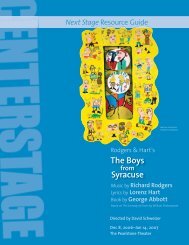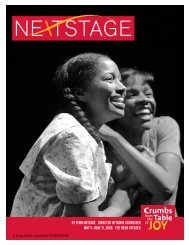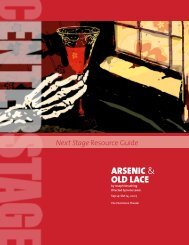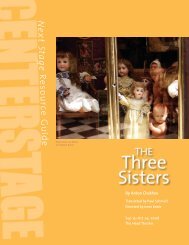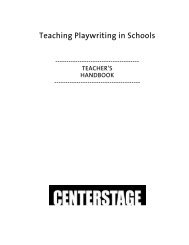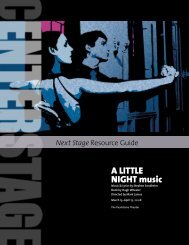Joe turner's Come and Gone - Center Stage
Joe turner's Come and Gone - Center Stage
Joe turner's Come and Gone - Center Stage
You also want an ePaper? Increase the reach of your titles
YUMPU automatically turns print PDFs into web optimized ePapers that Google loves.
strategically lured into gambling to justify their incarceration.<br />
From this systematized neo-slavery, plantations <strong>and</strong> other<br />
industries benefited from the work of these prisoners.<br />
Jonah <strong>and</strong> the Whale: In the<br />
Hebrew Bible, the Book of<br />
Jonah is the fifth book in a<br />
series of books called the Minor<br />
Prophets. The plot centers on<br />
a conflict between Jonah <strong>and</strong><br />
God. God calls Jonah to proclaim<br />
judgment to Nineveh, but Jonah<br />
resists <strong>and</strong> attempts to flee. He<br />
goes to Joppa <strong>and</strong> boards a ship<br />
bound for Tarshish. God calls up<br />
a great storm at sea, <strong>and</strong> the<br />
ship’s crew cast Jonah overboard<br />
in an attempt to appease God. A great fish (usually thought of<br />
as a whale), sent by God, swallows Jonah. For three days <strong>and</strong><br />
three nights Jonah languishes inside the creature’s belly. He<br />
repents his disobedience <strong>and</strong> calls upon God for mercy. God<br />
speaks to the fish, which vomits out Jonah safely on dry l<strong>and</strong>.<br />
After his rescue, Jonah obeys the call to prophesy against the<br />
people of Nineveh; they repent, <strong>and</strong> God forgives them.<br />
Juba: A dance of African American slaves, found throughout<br />
the Caribbean <strong>and</strong> the southern United States. It is danced<br />
by a circle of men around two men who perform various<br />
steps (e.g., the juba, the long dog scratch, the pigeon wing) in<br />
response to a rhythmic call <strong>and</strong> to the clapping (patting juba)<br />
of the other dancers.<br />
Outhouse: An outhouse<br />
(also known as a privy, kybo,<br />
jakes, or earth-closet) is a type of<br />
toilet, without flush or sewer, in a<br />
small structure separate from the<br />
main building.<br />
Pentecostal: Often associated<br />
with working-class Blacks, the<br />
African American Pentecostal<br />
faith is distinguished from other<br />
Christian denominations by the<br />
belief that church members must be “sanctified”—that is, they<br />
must live a pure <strong>and</strong> holy life. The emphasis on The Book of<br />
Acts <strong>and</strong> its doctrine regarding the “tongues of fire” is unique<br />
to the Pentecostal faith. Pentecostals believe that the presence<br />
of the Holy Spirit (<strong>and</strong> one’s sanctified status) can be verified<br />
through the “speaking in tongues.” The African American<br />
Pentecostal church has a long history of female leadership.<br />
River Jordan: A river in Southwest Asia flowing through the<br />
Great Rift Valley into the Dead Sea. Historically <strong>and</strong> religiously,<br />
it is considered one of the world’s most sacred rivers. In the<br />
Bible, crossing the River Jordan was the final step of the<br />
Israelites’ journey out of slavery in Egypt; accordingly, the<br />
Jordan symbolizes freedom from bondage. The river crossing is<br />
also a symbol of death <strong>and</strong> the passage from life’s sorrows to<br />
heaven.<br />
Rootworkers: Rootworkers hold several tenets in common,<br />
among them: 1) There is One God: most rootworkers believe in<br />
one divinity that we must ultimately answer to for our actions.<br />
Under that Supreme Being, however, there are many forces<br />
(Orisha, Angels, Saints, Ancestors, etc.) that can be called up to<br />
intercede on the behalf of humans. There was no conflict for<br />
Christian rootworkers between the beliefs of the church <strong>and</strong><br />
their work. 2) Physical death is not final: the soul of a person<br />
is eternal <strong>and</strong> can communicate with the living. Spirits of the<br />
dead have extraordinary power to impart wisdom because<br />
they have moved on to a plane where the past, the present,<br />
<strong>and</strong> the future are one. 3) The use of divination: rootworkers<br />
employ bones, shells, dream interpretation, the ability to<br />
recognize omens in nature, <strong>and</strong> other forms of reading<br />
truth—past, present, or future—in signs <strong>and</strong> symbols. This is<br />
connected to a belief in the earth as sacred <strong>and</strong> connective.<br />
Sharecropping: A<br />
system of agricultural<br />
production in which<br />
a l<strong>and</strong>owner allows a<br />
tenant farmer to work<br />
l<strong>and</strong> in return for a share<br />
of the crop produced.<br />
In Reconstruction-era<br />
America, sharecropping<br />
worked in collaboration<br />
with convict leasing<br />
to keep freed slaves<br />
subjugated in roles little<br />
different than their former subjugation. To avoid becoming<br />
convict laborers, farmers were forced to enter into extremely<br />
disadvantageous sharecrop agreements that generally left<br />
them permanently in debt to the l<strong>and</strong>owner.<br />
Voodoo: Voodoo (or hoodoo) is the American or Caribbean<br />
form of Voudon, a religious practice originating in West Africa<br />
<strong>and</strong> found throughout the African diaspora. The core functions<br />
of Voodoo are to explain the forces of the universe, influence<br />
those forces, <strong>and</strong> influence human behavior. Voodoo’s oral<br />
tradition of faith stories carries genealogy, history, <strong>and</strong> fables<br />
to succeeding generations. Adherents honor deities <strong>and</strong><br />
venerate ancient <strong>and</strong> recent ancestors.<br />
Next <strong>Stage</strong>: <strong>Joe</strong> Turner’s <strong>Come</strong> <strong>and</strong> <strong>Gone</strong> | 15



